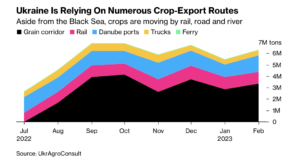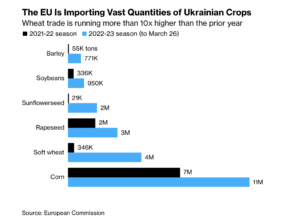President Donald Trump on Friday signed an executive order temporarily expanding the amount of beef the U.S. can import from Argentina, a move the White House says is aimed at…
Concerns Over Black Sea Grain Deal
Late last week, Reuters writers Huseyin Hayatsever and Guy Faulconbridge reported that, “Russia on Friday threatened to bypass the UN-brokered grain deal unless obstacles to its agricultural exports were removed, while talks in Turkey agreed removing barriers was a necessary condition to extending the agreement beyond next month.
“The Black Sea grain deal, first signed last July and twice renewed [in November and March], is an attempt by the United Nations to ease a food crisis that predated the Russian invasion of Ukraine, but has been made worse by the most deadly war in Europe since World War Two.”
The Reuters article indicated that, “Russian Foreign Minister Sergei Lavrov attending talks in Ankara said he and Turkish counterpart Mevlut Cavusoglu discussed ‘a failure’ to implement the terms of the deal.”
“Lavrov said that if the West did not want to be honest about what UN Secretary-General Antonio Guterres had sought to do with the deal, then Ukraine would have to use land and river routes to export.”
Friday’s article added that, “More than 27 million tonnes of grain and other foodstuffs have been exported from Ukraine aboard 881 outbound vessels since the Black Sea Grain Initiative began in August, official data shows.”

Hayatsever and Faulconbridge pointed out that, “While Russian food and fertiliser exports are not under sweeping Western sanctions, Moscow says restrictions on payments, logistics and insurance industries are a barrier.”
Reuters writer Naveen Thukral reported today that, “Chicago wheat futures climbed more than 1% on Monday, rising for the first time in four sessions as Russia’s threat to bypass a UN-brokered grain deal underpinned prices.”
“Russia on Friday threatened to bypass the UN-brokered grain deal unless obstacles to its agricultural exports were removed, while talks in Turkey agreed removing barriers was a necessary condition to extending the agreement beyond next month,” Thurkral said.
Meanwhile, Reuters writer Luiza Ilie reported late last week that, “Thousands of farmers protested across Romania on Friday over the impact of Ukrainian grain imports on prices, blocking traffic and border checkpoints with tractors and trucks and urging the European Commission to intervene.
“Anger is rising among farmers in Central and Eastern Europe over a flood of cheap Ukrainian grain imports, exempt from customs fees until June 2024, which have hurt prices and sales of local producers.”

And Bartosz Brzezinski reported last week at Politico that, “Poland will temporarily stop all imports of grain from Ukraine, the two countries’ governments announced Friday.
“The measure comes after a meeting earlier in the day between Poland’s new Agriculture Minister Robert Telus, who took office Thursday, with his Ukrainian counterpart Mykola Solskyi at a border crossing between the two countries.”
In more specific reporting regarding Ukrainian grain exports, Reuters writer Pavel Polityuk reported last week that, “Ukraine may export a further 15.6 million tonnes of grain in the April to June quarter, which would unexpectedly lift this season’s exports to nearly 53 million tonnes, the AgroPortal agency quoted the first deputy farm minister as saying on Thursday.
“Ukraine’s 2022 grain harvest fell sharply to around 53 million tonnes due to Russia’s invasion of the country, from a record 86 million tonnes in 2021.”
In an article today, Reuters’ Polityuk reported that, “Ukraine’s grain exports for the 2022/23 season were at 38.8 million tonnes as of April 10, Agriculture Ministry data showed on Monday.
“The ministry gave no exact comparative data for the same date a year ago but said Ukraine had exported 45.3 million tonnes of grain as of April 15, 2022.”
With respect to planting in Ukraine, Polityuk reported last week that, “Ukrainian farms have sown 620,500 hectares of spring grains as of April 7, but rainy weather has delayed field work, agriculture ministry data showed on Friday.”





